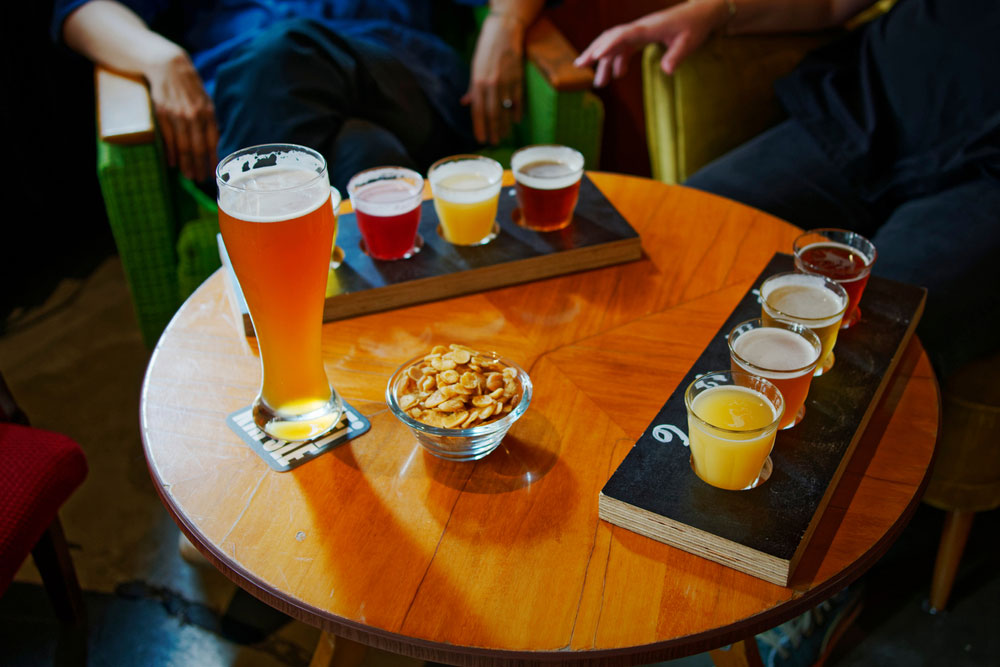A virtual beer tasting event is one that enables individuals or groups to participate in a beer tasting event from the comfort of their own homes. Participants often get a beer tasting kit that includes many different varieties of beer to taste. A beer expert or brewer conducts participants through the virtual beer tasting event, describing the tastes, smells, and characteristics of each beer.
Interactive components such as live video streaming, chat rooms, and Q&A sessions are often used in the virtual beer drinking experience. Attendees may also be able to learn about the history and brewing process of the beers being sampled. Virtual beer tastings may be a fun and instructive way to try new beers and interact with people who like craft beer.
What kind of questions are usually asked?
Here are some sample virtual beer tasting questions that participants might ask
- What is the history and background of this beer?
- What style of beer is this, and what are its defining characteristics?
- What are the different flavors and aromas that you should expect when tasting this beer?
- What foods or snacks would pair well with this beer?
- What makes this beer unique or special compared to other beers of the same style?
- What temperature should this beer be served at to fully appreciate its flavors?
- What are the key ingredients used to brew this beer?
- How long does the brewing process take for this particular beer?
- Can you recommend other beers or styles that someone who enjoys this beer might also like?
- Are there any particular breweries or regions that are known for producing beers of this style?
Of course, these are just a few examples of potential questions, and you should feel free to ask anything that comes to mind during the virtual beer tasting event.

How much does virtual beer tasting cost?
The cost of virtual beer tastings varies greatly based on the firm, the number of beers included in the tasting, and the beer guide or expert directing the event. Some virtual beer tastings are free; however, the majority of events require the purchase of a beer kit or individual beers to sample.
A virtual beer tasting may cost anywhere from $20 to $100 or more per participant, depending on the business and the varieties of beers included in the tasting kit. Some businesses may additionally charge a fee for shipping and handling.
When signing up for a virtual beer tasting event, always read the pricing information and compare costs and offers from various providers to discover the best choice for your budget and tastes.
How do i sign up for virtual beer tasting?
There are several websites and companies that offer virtual beer tasting events, and signing up is typically done through their website. Here are a few examples:
- Tavour: Tavour is an online beer retailer that offers a variety of virtual beer tasting events. You can sign up for their beer club to receive regular shipments of curated beers, or purchase tickets for individual virtual beer tasting events on their website.
- BrewDog: BrewDog is a craft brewery that offers virtual beer tasting events through their website. Participants can purchase a tasting kit that includes several different beers and join in on a live-streamed tasting event with a BrewDog beer expert.
- CraftShack: CraftShack is an online retailer that offers virtual beer tasting events featuring a selection of craft beers. You can purchase a tasting kit on their website and join in on a virtual tasting event led by a beer expert.
- City Brew Tours: City Brew Tours is a company that offers guided tours of local breweries, but they also offer virtual beer tasting events. You can sign up for a private or group virtual beer tasting event on their website, and they will ship the beer directly to your door.
These are just a few examples, and there are many other companies and breweries that offer virtual beer tasting events. It’s always a good idea to read reviews and do some research before signing up for a virtual beer tasting to ensure you find an event that suits your preferences and budget.

How to host your own virtual beer tasting
Hosting a virtual beer tasting can be a fun and educational experience for participants. Here’s a step-by-step guide on how to host a virtual beer tasting:
- Choose a platform: Select a video conferencing platform that allows for interactive communication, such as Zoom, Google Meet, or Microsoft Teams. Ensure all participants have access to the chosen platform and are familiar with its features.
- Determine the date and time: Coordinate with the participants to find a suitable date and time for the virtual beer tasting. Consider time zones and participants’ schedules when setting the event.
- Select the beers: Choose a theme for your virtual beer tasting, such as beers from a specific region, beer styles, or a mix of different types. Decide on the number of beers you want to include (typically 3-5), and provide participants with a list of the selected beers in advance, so they can purchase them or find alternatives.
- Send invitations: Send out invitations to your virtual beer tasting, including the date, time, platform details, and the list of selected beers. Encourage participants to acquire the beers ahead of time to fully participate in the tasting.
- Provide beer information: Create a document or email with information about each beer, including the name, brewery, beer style, tasting notes, and any interesting facts. Share this information with participants prior to the event, so they can familiarize themselves with the beers.
- Set up the environment: Prepare a well-lit area for the virtual tasting. Arrange the beers, appropriate glassware, water, and any other necessary tools, such as bottle openers. Have a notepad and pen ready to take notes during the tasting.
- Introduce the beers: Start the virtual tasting by introducing each beer to the participants. Share the background information, including the brewery, beer style, and any notable characteristics. Discuss the beer’s appearance, aroma, taste, and mouthfeel. Encourage participants to ask questions and share their own observations.
- Guide the tasting process: Walk participants through the tasting process step by step. Start with observing the beer’s appearance, including its color, clarity, and head. Move on to smelling the beer and describing its aromas. Finally, guide participants to taste the beer, discussing the flavors, body, bitterness, and finish. Encourage everyone to share their experiences and opinions.
- Facilitate discussion: Foster a lively discussion among participants. Encourage them to share their thoughts, preferences, and any interesting anecdotes related to the beers. Discuss the brewing process, ingredients, beer history, and general beer-related topics to keep the conversation engaging.
- Offer guidance on beer and food pairings: Suggest food pairings that complement the beers being tasted. Provide participants with a list of suggested pairings or discuss them during the virtual event. This can enhance the tasting experience and allow participants to explore the flavors and interactions between beer and food.
- Take breaks and stay hydrated: Remind participants to stay hydrated and take breaks between beers. Provide water or palate cleansers like plain crackers or pretzels to refresh their palates.
- Enjoy and have fun: Remember, the primary goal of a virtual beer tasting is to have a great time exploring and enjoying different beers. Encourage participants to relax, share their experiences, and have fun throughout the event.
By following these steps, you can host an engaging and enjoyable virtual beer tasting experience for all participants.

Some interesting beer facts
Oldest Recorded Recipe: The oldest recorded beer recipe dates back to around 1800 BCE in ancient Mesopotamia (modern-day Iraq). It is a hymn to the goddess Ninkasi and includes instructions for brewing beer using barley.
Reinheitsgebot: The Reinheitsgebot, also known as the “German Beer Purity Law,” was enacted in 1516 in Bavaria, Germany. It stipulated that beer could only be brewed using barley, water, and hops, ensuring the quality and purity of the beer. Yeast was added to the list later when its role in fermentation was understood.
Most Consumed Alcoholic Beverage: Beer is the most widely consumed alcoholic beverage in the world. It is enjoyed in various forms, styles, and flavors across different cultures and regions.
World’s Oldest Brewery: The Weihenstephan Brewery in Bavaria, Germany, holds the title of the world’s oldest continuously operating brewery. It traces its roots back to 768 CE and has been brewing beer for over a thousand years.
Beer and Civilization: Beer played a significant role in the development of early civilizations. It was a safer alternative to drinking water, which was often contaminated, as the brewing process killed harmful bacteria. The production and consumption of beer brought people together and helped form social bonds.
Beer Styles: There are numerous beer styles worldwide, each with its own unique characteristics. Some popular beer styles include lagers, ales, stouts, IPAs (India Pale Ales), wheat beers, and sour beers. Each style has its distinct brewing techniques, ingredients, and flavors.
Craft Beer Revolution: The craft beer movement, also known as the microbrewery revolution, gained momentum in the late 20th century. It led to the emergence of small, independent breweries that focus on producing unique, flavorful, and often experimental beers. Craft breweries prioritize quality, innovation, and a connection to the local community.
Largest Beer-Producing Countries: China holds the title for the largest beer-producing country in the world, followed by the United States and Brazil. These countries have robust beer industries and a wide range of beer brands.
Beer’s Health Benefits: Moderate beer consumption has been associated with several health benefits. It has been linked to a reduced risk of heart disease, improved bone density, and potential cognitive benefits. However, it’s important to note that excessive alcohol consumption can have adverse effects on health.
Beer Festivals: Beer festivals are celebrated worldwide, providing an opportunity for beer enthusiasts to sample a wide range of beers, learn about brewing techniques, and celebrate beer culture. The Oktoberfest in Munich, Germany, is one of the most famous beer festivals, attracting millions of visitors each year.
These fascinating facts highlight the rich history, diversity, and cultural significance of beer. Whether you’re a beer aficionado or simply enjoy an occasional pint, there’s always something interesting to discover about this beloved beverage. Cheers!
